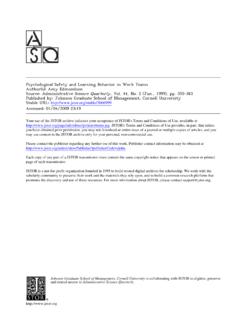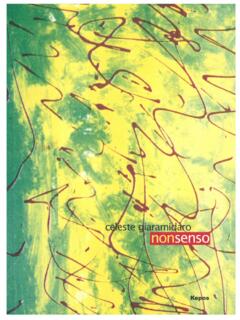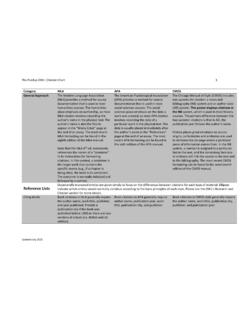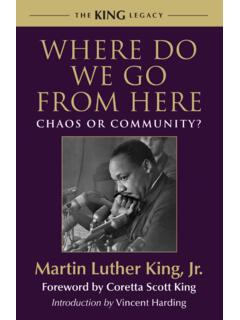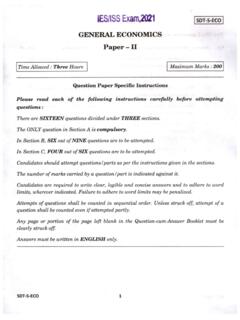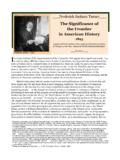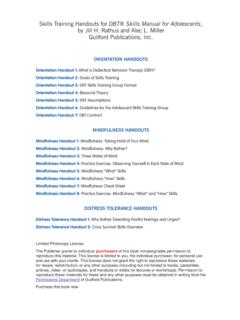Transcription of The Secret Teachings of the Masonic Lodge
1 Contents Introduction 7 Part I The Masonic Lodge I. Masonic Nature and Influence 10 2. Masonic Religion 35 3. Masonic World View 50 4. Masonic Morality 61 Part 2 Religious Secrets: Beliefs 5 The Plan of Salvation 78 6. The Rule of Faith and Practice 93 7. The Fatherhood of God 100 8. The Nature of God 108 9 The Name of God 119 10. Jesus Christ 126 11. The Nature of Man 139 12. Hell 153 A Christian Response to Part 2 161 Part 3 Religious Secrets: Practice 13. Blaspheming God's Name 14. Swearing Oaths 15. Uniting All Religions 16. Influencing the Church Part 4 Mystical Secrets 17. The Occult 18. Spiritism 19. Mystery Religions 20. Deception Epilogue The Legacy of Christian Masonry Notes Selected References Masonry at a Glance Index of Subjects Index of Persons 168 178 192 202 215 231 244 254 282 317 323 325 331 As a fraternity, we are always ready to be judged-severely and critically.
2 Francis G. Paul, 33d Degree, Sovereign Grand Commander, 7be Northern Light, May 1988 1 Masonic Nature and Influence Masonry (also known as Freemasonry or 'The Lodge ") is a powerful, old fraternal order that began early in the eigh-teenth century. According to most Masonic authorities, modern Masonry (also called "speculative" Masonry) can be traced to the founding of the first Grand Lodge in London in 1717.' The Lodge is also a Secret society. In fact, the Encyclopae-dia Bn'tannica classifies it as the largest Secret society in the world. To maintain its secrets, Masonry uses symbolism, Secret oaths, and Secret rituals to instruct new members called "Initi-ates." Each new member swears during these Secret ceremon-ies to remain loyal to the Lodge and its Teachings . The Teachings instruct each new candidate how he is to serve and the rewards he can expect. In addition, Masonry views its mission in life as helping to bring the beliefs of all men into harmony-a harmony based primarily on Masonic Teachings .
3 ' Two of these Teachings form the foundation of all Masonry. First is their belief in the universal fatherhood of God and brotherhood of man. By thiS, Masons teach that all men-Mus-lims, Jews, Hindus, Mormons, BuddhiSts, and Christians--re-gardless of their personal religious views, are the spiritual sons of God. Masonry's second foundational belief is that reforming personal character and practicing good works will secure God's 10 Masonic Nature and Influence J J favor. In other words, the Masonic Lodge clearly teaches that the good character and good works of a Mason will earn him a place in the "Celestial Lodge Above" ( , heaven). THE NAllJRE OF MASONRY Several leading Masons have defined Masonry. According to Alhert G. Mackey in Revised Encylopedia of Freemasonr)" "All [Masons] unite in declaring it to be a system of morality, by the practice of which its members may advance their spiritual interest, and mount by the theological ladder from the Lodge on earth to the Lodge in heaven.
4 ".' Other respected Masonic au-thorities define Masonry in the following ways: "Masonry is the realization of God by the practice of Brother-hood.""' "It is a science which is engaged in the search after Divine Truth, and which employs symbolism as its method of in-struction. "~ "[Masonry is] that religious and mystical society whose aim is moral perfection on the basis of general equality and fra-ternity. "6 "Freemasonry, in its broadest and most comprehenSive sense, is a system of morality and social ethics, a primitive reli-gion and a philosophy of life .. Incorporating a broad humanitarianism, .. it is a religion without a creed, being of no sect but finding truth in all .. It seeks truth but does not define truth. '" A man who becomes a Mason is defined by Masonic authorities as "one who has been initiated into the mysteries of the Frater-nity of Freemasonry.
5 ", On the other hand, defining Masonry presents us with a dilemma. No single definition of Masonry is accepted by all Ma-sons. This is because the practice of Masonry means many dif-ferent (and sometimes contra!)') things to individual Masons. For some of its members, Masonry has become little more than a social club; for others, Masonry dominates their life and work. 12 The Secret Teachings oJ the Masonic Lodge This point is well stated by leading Masonic authority Henry Wilson Coil in A Comprehensive View of Freemasonry: Nobody knows what Freemasonry is, or, if that statement be deemed too strong, at least no one has been able to demon-strate that he knows the answer to the question. What one [Mason or Masonic authority] assem another of apparently equal ability doubt' or denies .. Nor is this divergence of opinion due to ignorance or lack of investigation, for con-flicts arise principally among the most zealous and erudite of Masonic students.
6 The Fraternity has no central authority to declare its creed and no cenSor of books to check aberra-tions. Anyone, either within or without the Society, may speak or write about it what he wills, and many have taken advantage of that liberty.' Coil proceeds to discuss the basic problem of definition presented by Freemasonry: Freemasonry has spread so widely, has expanded into so many degrees [more than 1,100 degrees according to Coil:, Masonic Encyclopedia, p. 600; cf. Encyclopaedia Britannica, Micropaedia, 15th ed., "Freemasonry"], and has under-gone so many changes, to say nothing of having been subject-ed to so many diverse interpretations, that the question: What is Freemasonry? must first be answered by another question: When, where, and what phase of it? Though much of Masonic doctrine has remained remarkably well fixed and stable, its laws have changed, its degrees have changed, its ceremonies have changed, its religion has changed, and doubtless the concepts of it by its members have changed.
7 " Through its history Masonry has changed, and even today Masonry worldwide is not uniform. This characteristic of Ma-sonry presents an important issue that needs to be resolved at the outset: Does Masonry's lack of a central authority make it incapable of being subject to legitimate criticism? The answer is no. The mere fact that Masonry has evolved historically or that Masons disagree among themselves is irrelevant to the produc-tion of a factual analysis. Some Masons imply that because Ma-sonry has no "official voice," some Masonic writers are only voicing personal opinions that have no authority. Consider the Masonic Nature and Influence 13 argument of Masonic historian Alphonse Cerza. Cerza claims that some Masons have advanced theories or made statemenL' that merely express personal views, implying that such views are not Masonic and therefore irrelevant to Masonry: Some Masonic authors have unintentionally supplied oppo-nents of the Craft with some of their arguments.
8 Dr. Albert Churchward, J. S. N. Ward, W. L. Wilmshurst, Arthur Waite, and others have advanced theories and made statements that express personal views. Some of their statements are not based on fact, are mere theories, and are not generally ac-cepted by Masons. But the anti-Masons pick up these state-ments and hold them up to ridicule by stating that they are from , of " Masonic authority." These anti-Masons have difficulty in understanding that Freemasonry has no "official voice" and that freedom of thought and expression is one of the fundamental principles of the Order." Cerza cites the lack of a central authority in Masonry as a reason critics have been able to quote Masons in their so-called unfounded attacks. But the issue is, "Are what these Masonic writers say true for Masonry'" It is not the fault of one who ana-lyzes Masonry that Masonry has no central authority.
9 But Ma-sonry clearly has a specific history. Masonry clearly has a gen-eral consensus as to iL' world view. Even the leading Masonic authority, Albert Mackey, has admitted "the doctrine of Freema-sonry is everywhere the same. "" A, we have seen above, Coil himself admits that much of Masonic doctrine "has remained remarkably well fixed and stable." The real issue is whether or not the statements made by these Masonic authorities are in harmony with what Masonry represents and constitutes, both historically and in terms of its world view. That is the only issue that needs to be decided. Ma-sonry may not have a single human authority, but few Masons will dispute that Masonry iL<elf provides the authority. [n The Newly-Made Mason, H. L. Haywood refers to the obligations placed upon the new Mason: I hereby solemnly and sincerely promise and swear that as a beginning Craftsman in the Masonry of the mind and as a Newly-Made Mason I will not permit myself to be led into 14 Tbe Secret Teacbings of tbe Masonic Lodge making hasty conclusions.]
10 I promise and swear that I will not listen to those who are not competent to teach me. There will be nothing binding on me except the truth. If there be those who say one thing and if there be others who say the oppo-site thing, I will consider that it is Freemasonry itself which finally is to decide berween them." What we present in this book, therefore, is an analysis of Masonry itself, as stated by Masonic authorities recommended by at least half of the Grand Lodges in the United States. We recognize that all of what is presented may not necessarily coin-cide with the individual beliefs of a given Mason. Some Masons have no interest in the history and doctrines of Masonry. Some are unfamiliar with its occult aspects. But for others, Masonry is a religious world view that dominates their life and their work. Regardless of the fluid and sometimes historically contra-dictory nature of Masonry, there remains a solid core of belief that is central to the majority of Masonry and to which almost all Masonic writers appeal.


